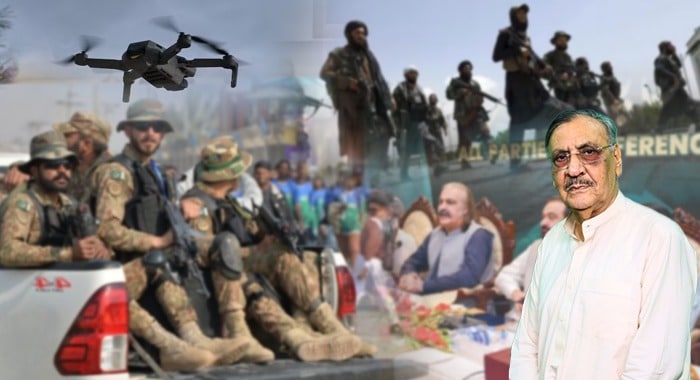Brig (R) Mehmood Shah
The deteriorating security situation in Khyber Pakhtunkhwa is a matter of grave concern. With the surge in terrorist activities, the region has once again become vulnerable to a threat that was, until recently, under relative control. Yet, instead of unified action, we witness political confusion, shifting loyalties, and rhetorical resistance to necessary security operations. It is unfortunate that in the face of such a crisis, the political leadership appears more invested in narratives than in national responsibility.
Chief Minister Ali Amin Gandapur recently proposed an All Parties Conference to seek national consensus on the matter, yet his government’s simultaneous opposition to any military operation raises troubling questions. One cannot control terrorism with press statements alone. A government, be it federal or provincial, is obliged to act decisively when public safety is at risk. If the government is unwilling or unable to take action, it fails not just its people, but the state itself.
Operations are not desirable under ordinary circumstances. But they become indispensable when terrorism crosses a threshold where civil authority can no longer contain it. The provincial government, rather than obstructing or politicizing such actions, must coordinate with the federal government and security forces to address the threat. Publicly stating “we will not allow an operation” is not a policy it is a political slogan that undermines national interest.
Historically, political parties have displayed glaring inconsistencies. When the Awami National Party (ANP) was in power, it not only supported but actively coordinated with the army during the Swat operation. The operation was a landmark achievement meticulously planned, carefully executed, and internationally praised. Even U.S. military officials visited the area to witness Pakistan’s counterterrorism success. I was personally present in those times and can vouch for the scale and precision of that mission.
Today, however, some of the same political factions oppose military operations, using anti-army rhetoric to score points while conveniently forgetting their own past role in counterterrorism. This political duplicity needs to be exposed and questioned.
We must understand that national interest is non-negotiable. Whether in government or opposition, political parties must act with unity when the state’s security is under threat. Divisions serve only the enemy. In fact, some political actors have previously gained from such divisions. The current ruling party in the province has historically benefitted from Taliban support allegedly asking militants to target rival party gatherings while sparing their own. This manipulation of terror for political gain is a bitter reality of our recent history.
But such politics cannot continue. The people of Khyber Pakhtunkhwa have suffered long enough. They deserve peace, not political games. While political parties talk about past governments and deflect blame, it must be asked: what have you done in your three consecutive tenures? Have education, healthcare, and law enforcement improved? Has terrorism decreased or increased under your leadership?
Moreover, terrorism in KP is not merely an internal issue. It is part of a broader regional agenda. India, and to some extent the United States, continue to sabotage Pakistan’s internal stability and strategic projects like the China-Pakistan Economic Corridor (CPEC). India, in particular, funds and supports anti-state elements who carry out attacks in our western provinces.
It is critical, therefore, to strengthen our border with Afghanistan. While we have heavily fortified our eastern border with India, the western border remains porous. Historically, we’ve avoided strict fencing and regulation due to ethnic ties across the Durand Line, but in today’s context, that approach is no longer viable. Borders must function as sovereign boundaries, not open corridors for militants.
The Afghan interim government must also be pressured to act. Many of the Tehrik-e-Taliban Pakistan (TTP) militants operate from Afghan soil. Kabul must be convinced—if not compelled—to prevent these groups from launching attacks across the border. The recent assurance by Afghan authorities that some militants may be settled in Ghazni is a step in the right direction, but mere verbal commitments are not enough.
Domestically, we must root out facilitators, informers, and sympathizers embedded in our society. These individuals may not carry arms themselves, but they provide crucial logistical support to terrorists. Local communities should be empowered to report such individuals without fear of reprisal.
The recent All Parties Conference proposal by Chief Minister Gandapur also touched upon the issue of cross-border trade. While facilitating trade for livelihood is a legitimate concern, security must remain paramount. Any trade mechanism must be tightly regulated to prevent misuse by terrorist networks.
In conclusion, Pakistan cannot afford indecisiveness in the face of terrorism. National security is not a matter for political bargaining. Whether the threat comes from within or across borders, we must act—firmly and collectively. The government, opposition, and institutions must stand united. Khyber Pakhtunkhwa is an integral part of Pakistan, and its peace is a prerequisite for national stability. Political posturing must end. The fight against terrorism is not optional—it is inevitable.





